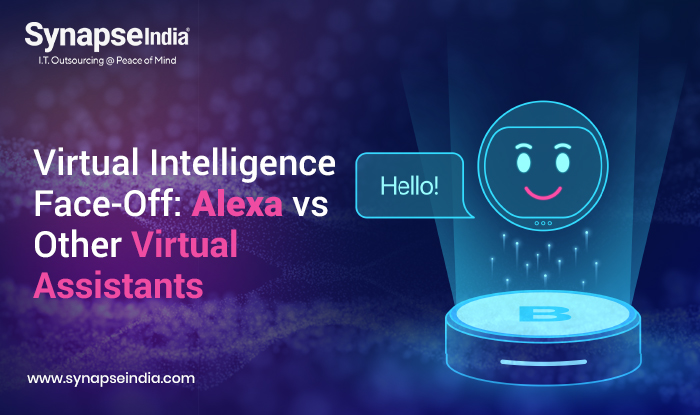 27 Jan 2024
27 Jan 2024“Amazon Alexa stands as a leading voice assistant for its extensive skills, seamless smart home integration, advanced voice recognition, constant updates, and a diverse Echo ecosystem.”

It has been debated for many years on which AI-virtual assistant works best. Many contenders are in the market like Amazon Alexa, Siri, Cortana, and many more. All these virtual assistants share the same functionalities and building principles. Yet there are different ecosystems for building and scope for each virtual assistant. These frameworks process natural language and return the relevant information to the searcher in milliseconds. Smart assistants help users to handle tasks promptly and allow them to complete them on time. For example, if you want to dial any number you can ask the smart assistant. These smart assistants can do everything, from ordering medicines to playing your favorite songs, and many more. In this blog, we will discuss these smart assistants, including Amazon Alexa Skill, Cortana, and Siri.

Alexa, developed by Amazon, is a virtual assistant powering Amazon Echo and other smart devices. Launched in 2014, Amazon Alexa is renowned for its voice-controlled smart home features, extensive skills library, and natural language processing. Users can interact with Alexa through Echo devices, asking questions, controlling smart home devices, and accessing a wide range of third-party skills.
Developed by Microsoft, Cortana is a virtual assistant introduced in 2015. Integrated into Windows devices and Microsoft services, Cortana assists users with tasks, searches, and calendar management. Known for its strong natural language processing, Cortana aims to provide personalized assistance, although its focus has shifted more toward enterprise applications in recent years.

Siri, developed by Apple, made its debut in 2011 as a voice-controlled personal assistant for iOS devices. Siri is recognized for its integration with the Apple ecosystem, allowing users to perform tasks, set reminders, send messages, and control smart home devices through voice commands. Siri's capabilities continue to expand with each iOS update.
Above we have discussed Amazon Alexa and its amazing features, now let’s discuss more on the comparison of Alexa and other virtual assistants.
| Feature | Alexa | Cortana | Siri |
|---|---|---|---|
| Developed By | Amazon | Microsoft | Apple |
| Release Year | 2014 | 2015 | 2011 |
| Integration | Echo devices, third-party devices | Windows devices, Microsoft services | iOS devices, Apple ecosystem |
| Voice Recognition | Excellent | Good | Excellent |
| Smart Home Control | Yes | Yes | Yes |
| Third-Party Integrations | Extensive | Limited | Limited |
| Device Compatibility | Extensive (Echo, third-party devices) | Limited (Windows devices) | Limited (iOS devices) |
| NLP | Strong | Strong | Strong |
| Privacy Concerns | Controversial | Microsoft emphasizes privacy | Apple emphasizes privacy |
| Cross-Platform Integration | Limited | Extensive (Microsoft ecosystem) | Limited (Apple ecosystem) |
Determining the "smartest" virtual assistant depends on various factors and user preferences. However, Amazon Alexa is often considered highly intelligent for several reasons:
Alexa boasts a vast and continuously growing skills library, allowing users to seamlessly integrate third-party applications and services. This extensive ecosystem enhances Alexa Skill Development versatility.
Alexa excels in smart home automation, providing users with robust control over a wide range of compatible devices. Its compatibility with numerous smart home brands contributes to its popularity.
Alexa's natural language processing capabilities enable users to interact with the virtual assistant more conversationally. It can understand the context and respond appropriately.
The Echo ecosystem, including devices like Echo Show and Echo Dot, contributes to Alexa's intelligence. The integration of these devices enhances the overall user experience.
Amazon Alexa consistently updates and improves Alexa's features. Regular software updates introduce new functionalities, skills, and improvements, ensuring Alexa stays at the forefront of virtual assistant technology.
Finding the best Amazon Alexa development framework services company involves considering several factors to ensure a successful and efficient development process. Here's a guide on how to identify the right company:
Look for companies with a proven track record in Alexa skill development. Check their portfolio, client testimonials, and the number of years they've been working on Alexa projects.
Ensure that the company has skilled developers proficient in Alexa Skills Kit (ASK) and Alexa Voice Service (AVS). Familiarity with AWS (Amazon Web Services) is also beneficial.
Review the company's past projects related to Alexa development. Assess the diversity and complexity of the Alexa skills they have built. This will give you insights into their capabilities.
Choose a company that demonstrates innovation and creativity in designing voice-driven applications. Alexa skills should not only be technically sound but also user-friendly and engaging.
Ensure that the company can develop custom Alexa skills tailored to your specific requirements. Additionally, they should have the capability to scale the solution as your needs grow.
By carefully evaluating these factors, you can find a suitable Amazon Alexa development framework services company that aligns with your project goals and expectations.
The competition among virtual assistants, including Alexa and others like Siri and Cortana, continues to drive innovation in the realm of voice-enabled technology. Each virtual assistant has its strengths and unique features, catering to the diverse needs of users within their respective ecosystems. Amazon Alexa, with its extensive skills library, strong smart home integration, and continuous updates, stands out for its versatility. It excels in providing a seamless and natural voice interaction experience, contributing to its popularity. The ongoing advancements in this space ensure that users can enjoy increasingly sophisticated and personalized experiences, enhancing the overall landscape of virtual assistant technology.


